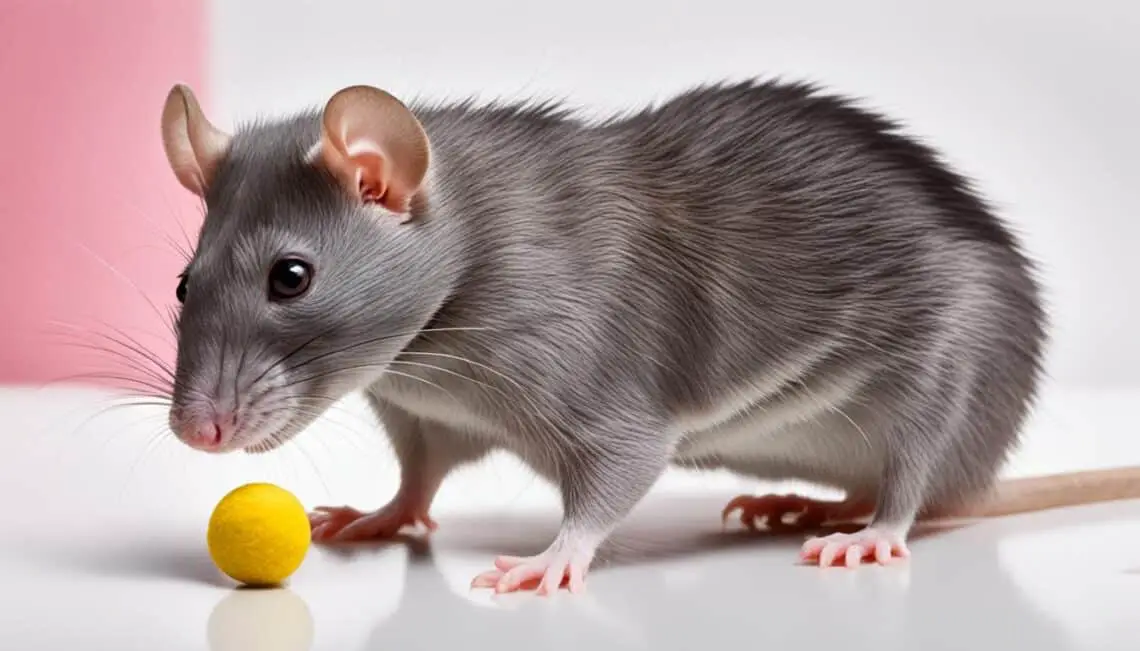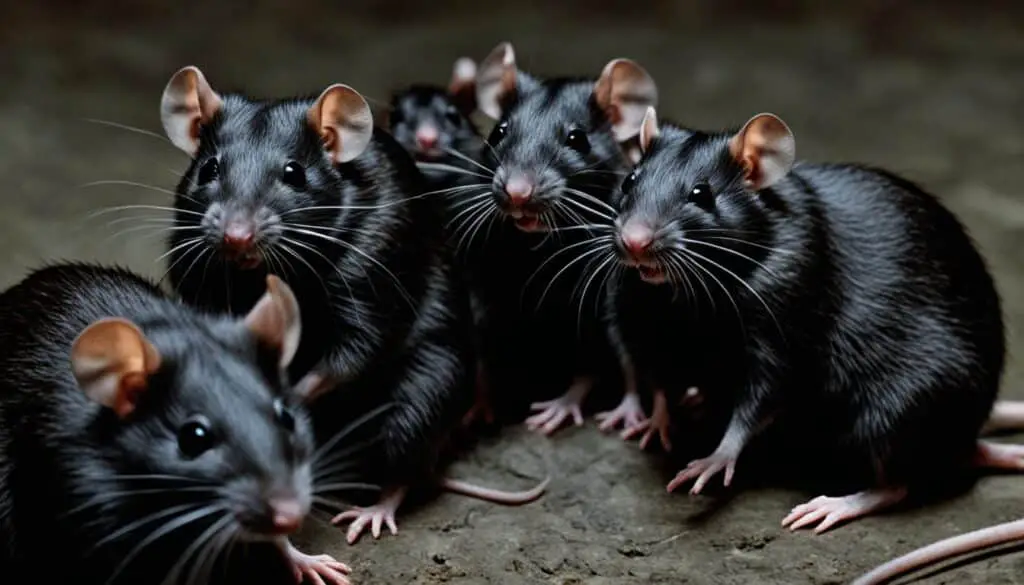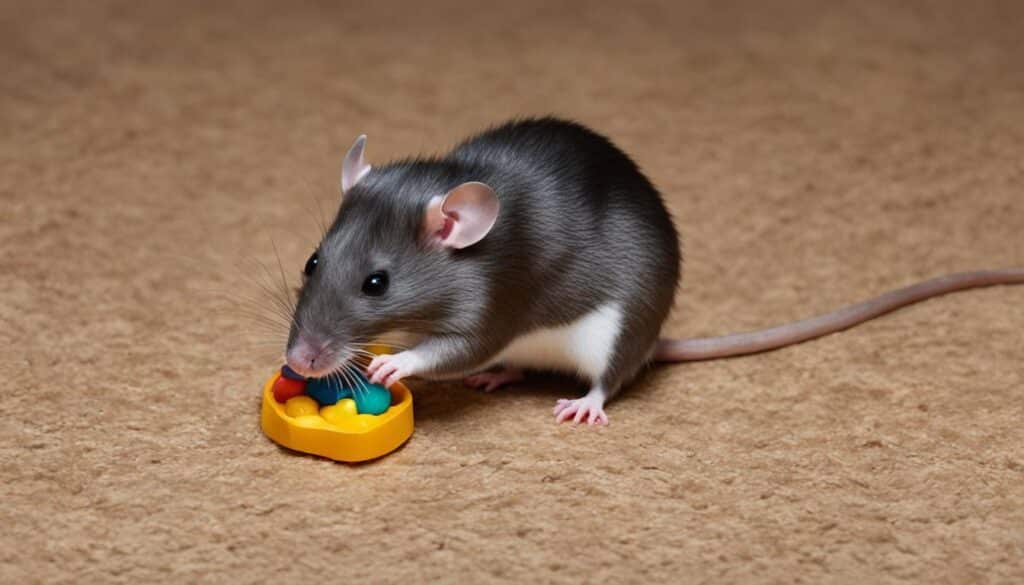As a rat owner, it’s important to understand how to prevent and handle biting in your pet rats. Biting can occur for various reasons, such as fear, rough play, or mistaking fingers for treats. To effectively address this issue, it’s crucial to determine the cause of biting and take appropriate measures.
Well-socialized rats are less likely to bite, but if you have rescues or unaltered males, they may exhibit biting behaviors. Neutering can be considered as a solution for territorial or aggressive rats, but it’s always advisable to consult with a veterinarian.
Key Takeaways:
- Understanding the reasons why rats bite is essential in handling their behavior.
- Biting can be a form of communication or a learned behavior.
- Building trust with scared rats can help prevent biting.
- Playful biting can be managed by establishing boundaries and using deterrents.
- Addressing hormonal aggression and territorial behavior may require neutering.
Reasons Why Rats Bite
Understanding the reasons behind rat biting is crucial in effectively addressing this behavior. Rats may bite for different reasons, including communication and learned behavior.
Firstly, biting can be a form of communication for rats, indicating fear or discomfort. Their poor eyesight and excellent hearing make them susceptible to feeling startled or defensive. When rats are scared or in pain, they may resort to biting as a way to express their emotions.
Secondly, biting can also be a learned behavior, particularly if the rat has not been properly handled or has experienced abuse in the past. Rats, like any other animal, can adapt their behavior based on their environment and experiences. If a rat has learned that biting is an effective way to defend itself or obtain something, it may continue to exhibit this behavior.
“Rats may bite to communicate fear or discomfort, and biting can also be a learned behavior influenced by their past experiences or improper handling.”
To effectively address biting behavior in pet rats, it is essential to identify the underlying reason for their biting. By understanding whether the rat is biting out of fear or if it has developed a learned behavior, pet owners can implement appropriate strategies to address the issue.
Now that we have explored the reasons behind rat biting, let’s delve deeper into how to handle scared rats in Section 3.
Dealing with Scared Rats
Scared rats can sometimes resort to biting as a defensive response, which can be a challenging behavior to address. When dealing with scared rats, it is crucial to avoid picking them up forcefully or abruptly, as this can escalate their fear and increase the likelihood of biting. Instead, a gradual approach centered around building trust and confidence will yield more positive results.
One effective strategy to build trust with scared rats is to spend time near their cage, allowing them to observe and become familiar with your presence. Sit or stand near their enclosure and engage in calm activities such as reading or talking softly. By doing this, you are helping the scared rat become accustomed to your presence without feeling threatened.
Offering treats is another crucial aspect of building trust with scared rats. Place the treats near the cage or in an open palm and allow the rat to approach at their own pace. Over time, as the rat becomes more comfortable, you can try gently stroking them using slow and gentle movements, paying attention to their response. If the rat shows signs of discomfort or tries to retreat, it’s important to respect their boundaries and give them more time to adjust.
Handling scared rats with gloves can provide an extra layer of protection and reassurance for both you and the rat. Gloves can help prevent accidental bites and give the scared rat a sense of security during essential handling, such as when administering medication or performing necessary veterinary procedures. However, it’s important to note that wearing gloves should not be a permanent solution, but rather a temporary measure to ensure safety when handling scared rats.
If a previously gentle rat suddenly starts biting, it may indicate an underlying health issue. In such cases, it is advisable to consult with a veterinarian to rule out any medical conditions that could be causing the behavior change. A thorough examination, including a check for dental problems or pain, can provide valuable insights and help determine the appropriate course of action to address the biting behavior.
Remember, building trust with scared rats is a gradual process that requires patience, consistency, and understanding. With time and positive reinforcement, scared rats can learn to feel more secure and develop healthier coping mechanisms, reducing the likelihood of defensive biting.
Addressing Playful Biting
Playful biting is a common behavior among rats. While most of the time it is harmless and part of their natural play, it’s important to understand the difference between playful nibbling and actual biting, which can be painful. Here are some strategies to address playful biting and ensure a safe and enjoyable playtime with your pet rats.
1. Communicating Boundaries
When a rat’s playfulness becomes a little too rough, it’s essential to establish clear boundaries. One effective method is to loudly squeal and pull away when bitten. This mimics the behavior of a rat in pain and can help them understand that their playful biting is causing discomfort. Consistently reinforcing these boundaries will help your rats understand what is acceptable behavior during play.
2. Using Deterrents
Another way to discourage playful biting is by using deterrents. Rubbing mint-scented hand cream or applying mint foot spray can help deter rats from biting. Most rats dislike the smell of mint, and it can help redirect their focus to other activities during playtime. Remember to use these deterrents sparingly and ensure they are safe and non-toxic for your rats.
3. Creating a Calm Environment
Rats are sensitive creatures, and an overexciting or stressful playtime environment can contribute to excessive biting. Creating a calm and peaceful setting can help reduce the likelihood of playful biting. Play soft background music or dim the lights to provide a soothing atmosphere. Avoid sudden noises or disturbances that may startle or agitate your rats during play.
“When it comes to playful biting, it’s important to understand your rats’ boundaries and communicate them effectively. By setting clear limits, using deterrents, and ensuring a calm environment, you can establish a safe and enjoyable playtime experience for both you and your furry companions.”
By implementing these strategies, you can address playful biting and create a positive and engaging playtime experience for you and your pet rats. Remember, rats are intelligent and adaptable animals, and with patience and consistent training, they can learn appropriate play behavior.
| Playful Biting Prevention Tips |
|---|
| Communicate boundaries by squealing and pulling away when bitten. |
| Use deterrents like mint-scented hand cream or foot spray. |
| Create a calm and peaceful playtime environment. |
Handling Hormonal and Territorial Behavior
Male rats may exhibit aggressive behavior due to hormones. Neutering can often help address hormonal aggression, particularly if done at a younger age. However, if the aggressive behavior has already become established over time, neutering may have limited effect. Hormonal rats may also exhibit territorial biting as a means of defense. Observation of warning signs such as raised fur, hunched back, displayed teeth, and raised front paws is important in identifying territorial behavior.
When dealing with hormonal aggression or territorial biting in rats, it is crucial to take appropriate measures to ensure the safety of both the rat and the owner. Neutering can help reduce the aggressive tendencies in male rats by decreasing the levels of testosterone. This procedure is more effective when performed at a younger age, before the aggressive behavior has become deeply ingrained.
However, it’s important to note that neutering may not completely eliminate aggressive behavior if it has already become firmly established over time. In such cases, additional behavioral interventions and training may be necessary to manage the aggressive tendencies. Consulting with a veterinarian who specializes in small animal behavior can provide valuable guidance and tailored solutions for handling hormonal aggression in rats.
Observation and Identification of Territorial Behavior
Rats are territorial animals, and they may display aggressive behaviors, including biting, to protect their territory. Recognizing the warning signs of territorial behavior is crucial in managing and preventing instances of rat biting. Some common indicators of territorial aggression in rats include:
- Raised fur
- Hunched back
- Displayed teeth
- Raised front paws
When a rat exhibits these behaviors, it is best to give them space and avoid provoking them further. Placing a rat in a secure and appropriately sized cage, providing environmental enrichment, and ensuring they have ample opportunities for exercise and mental stimulation can help alleviate territorial tendencies. Building positive relationships with rats through trust-building exercises, such as gentle handling and regular interaction, can also contribute to reducing territorial biting.
Neutering and Its Effects on Hormonal Aggression
Neutering, or castration, is a common procedure performed on male rats to address hormonal aggression. By removing the testes, the production of testosterone is significantly reduced, leading to decreased aggression levels in rats. Neutering is particularly beneficial when performed at a younger age, before the aggressive behavior becomes deeply ingrained.
Aside from reducing aggression, neutering can also have other positive effects on male rats’ health and behavior. It can help prevent testicular tumors and reduce the risk of prostate problems, which are common issues in intact male rats. Neutering may also contribute to a more docile and sociable temperament in male rats, making them more receptive to social interactions and less prone to aggression.
However, as with any surgical procedure, there are potential risks and considerations to be mindful of when neutering rats. It is essential to consult with a veterinarian experienced in small animal surgeries and follow their recommendations to ensure the best possible outcome for the rat.
Addressing hormonal aggression and territorial behavior in rats requires a comprehensive approach that combines neutering, behavior modification techniques, and environmental management. By understanding the underlying causes and implementing targeted interventions, pet owners can create a safe and harmonious environment for themselves and their rats.
Creating a Positive Association with Human Contact
Building trust with rats is crucial for preventing fear-biting and establishing a strong bond with your furry friends. By implementing the following strategies, you can create a positive association with human contact and ensure a harmonious relationship:
- Slow and steady interaction: Approach your rat with calm and gentle movements. Avoid sudden movements or actions that may startle or frighten them.
- Frequent bonding activities: Engage in regular activities that promote bonding, such as gentle petting, hand-feeding treats, or playing games that encourage trust building.
- Rewarding with treats: Use treats as positive reinforcement when your rat exhibits calm and non-aggressive behavior during human interactions. This helps them associate your presence with positive experiences.
- Avoiding cage bar interaction: Instead of trying to interact with your rat through the bars of their cage, open the door or allow them free time in a safe, rat-proofed area. This encourages direct contact and reduces any barriers between you.
- Squeaking loudly when bitten: If your rat bites you, emit a high-pitched squeak to communicate pain. This mimics the sound their companions would make, allowing them to understand that biting is not acceptable behavior.
- Gently moving hands and speaking softly: By displaying calm and non-threatening behavior, you can further reassure fearful rats and help them feel more at ease in your presence.
“Building trust with rats is a gradual process that requires patience and consistency. By implementing these strategies, you can create a positive environment for your rats and develop a strong bond based on trust and mutual understanding.” – Rat Lover
Remember, every rat is unique, and it may take time for them to fully trust and bond with you. Be patient, understanding, and respect their boundaries. With consistent effort and positive reinforcement, you can create a lifelong bond built on trust and love.
Conclusion
Preventing and handling biting in pet rats requires a thorough understanding of rat behavior and the underlying reasons for their biting. By addressing these reasons effectively, we can foster a harmonious relationship with our furry companions.
The key to biting prevention lies in building trust and creating a positive association with human contact. Spending time near their cage, offering treats, and gentle interaction can gradually build trust with scared or fearful rats. It is important to avoid picking them up until they feel comfortable. Remember, patience and consistency are essential in trust-building.
In addition, providing a calm and secure environment for your rats plays a crucial role in minimizing biting behavior. Ensuring they have enough space, mental stimulation, and proper nutrition can help reduce stress and aggression. Creating a safe haven for your rats will contribute to their overall well-being and prevent unnecessary biting incidents.
For cases of hormonal aggression, neutering can be considered. However, it is always advisable to seek veterinary advice before proceeding. Sudden changes in behavior may indicate underlying health issues that require professional attention. Consulting with a veterinarian will ensure that the appropriate measures are taken to address these behavioral changes.
By understanding rat behavior, investing time in trust-building activities, and creating a secure environment, we can significantly reduce biting incidents. Remember, every rat is unique, and it is crucial to approach their behaviors with empathy and patience. With consistent efforts, biting can be minimized, allowing for a loving and trusting bond with our pet rats.
FAQ
Why do rats bite?
Rats may bite for various reasons, including fear, rough play, or mistaking fingers for treats. Understanding the underlying reason for biting is crucial in addressing the issue effectively.
How can I deal with scared rats?
It is important to avoid picking up scared rats and instead spend time near their cage, gradually building trust by offering treats and stroking when the rat is comfortable. Gloves can be used for essential handling, and it is advisable to consult with a vet if a previously gentle rat suddenly starts biting, as it may indicate an underlying health issue.
How should I handle playful biting?
Playful biting is a common behavior among rats. It is important to understand the difference between playful nibbling, which is gentle and does not hurt, and actual biting. Loudly squealing and pulling away when bitten can help communicate to the rat that the behavior is painful. Rubbing mint-scented hand cream or using mint foot spray can also discourage biting. Avoiding overexciting games and ensuring a calm playtime environment can help prevent excessive biting during play.
What should I do about hormonal and territorial behavior?
Male rats may exhibit aggressive behavior due to hormones. Neutering can often help address hormonal aggression, particularly if done at a younger age. However, if the aggressive behavior has already become established over time, neutering may have a limited effect. Hormonal rats may also exhibit territorial biting as a means of defense. Observing warning signs such as raised fur, hunched back, displayed teeth, and raised front paws is important in identifying territorial behavior.
How can I create a positive association with human contact?
Building trust with rats is essential in preventing fear-biting. Slow and steady interaction, frequent bonding activities, and rewarding with treats can help rats develop a positive association with human contact. Avoiding interaction between cage bars and using the cage door or floor time for interaction is recommended. Squeaking loudly when bitten communicates pain, while gently moving hands and speaking softly can further signal non-threatening behavior to fearful rats.
How can I prevent biting in pet rats?
Preventing and handling biting in pet rats involves understanding the underlying reasons for the behavior and addressing them accordingly. Building trust, creating a positive association with human contact, and providing a calm and secure environment are key to preventing biting. Neutering may be considered for hormonal aggression, while seeking veterinary advice is important for addressing sudden changes in behavior. With patience, practice, and a deeper understanding of rat behavior, biting can be minimized and trust can be established, resulting in a harmonious relationship with your pet rats.







No Comments